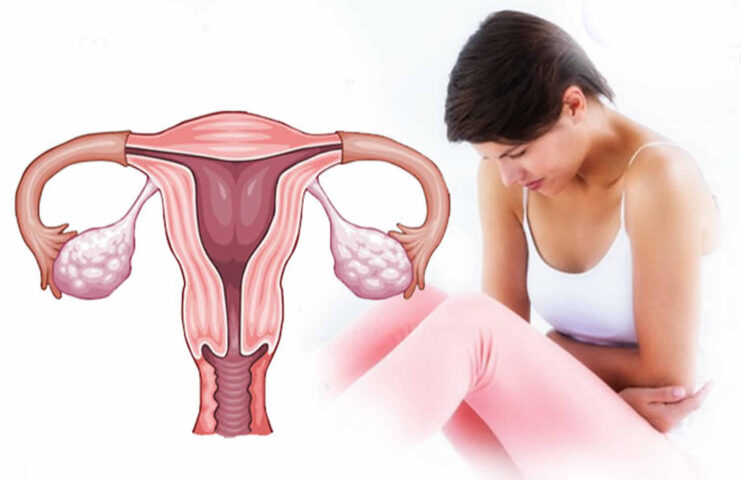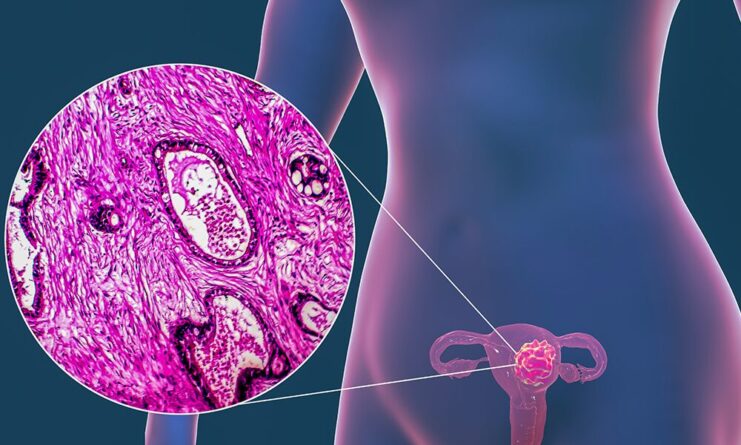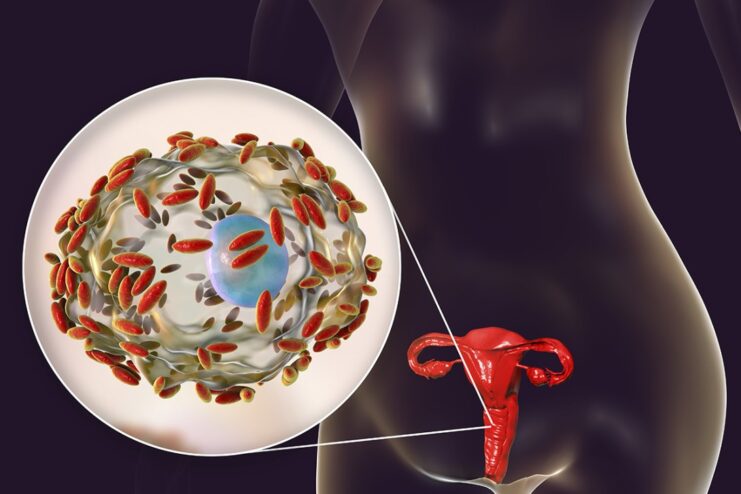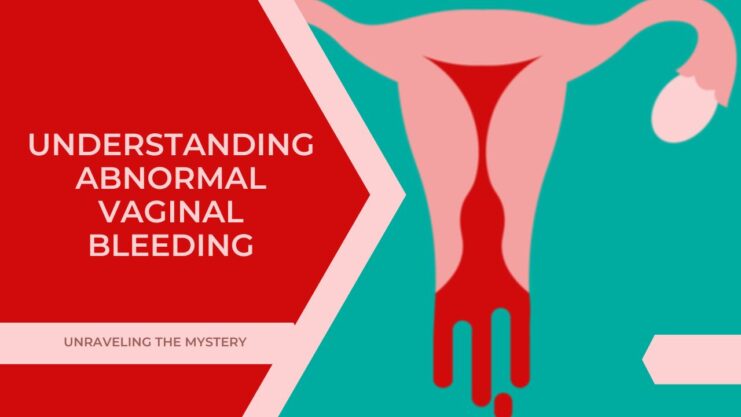It can occur in women outside of their regular menstrual cycles, a condition commonly known as intermenstrual bleeding. This occurrence often leads to anxiety and raises concerns about various potential causes.
Distinguishing between intermenstrual bleeding and irregular periods can sometimes be challenging. While vaginal bleeding can happen at any age, it is crucial to investigate cases involving pre-pubertal girls or postmenopausal women.
The causes encompass a broad spectrum, ranging from normal and benign conditions to potentially cancerous ones. Identifying the underlying cause requires careful examination and assessment.
Pregnancy?

Determining whether or not pregnancy is a factor is of utmost importance when experiencing intermenstrual bleeding. Early pregnancy testing plays a vital role in understanding the underlying cause of abnormal vaginal bleeding. While intermenstrual bleeding can occur for various reasons, pregnancy-related complications can significantly impact the management and treatment options.
When faced with intermenstrual, conducting a pregnancy test should be the first step. This simple test helps rule out pregnancy as a potential cause, as it can signify complications such as miscarriage, ectopic pregnancy, or molar pregnancy. These conditions require specific medical attention and necessitate a different approach to managing the bleeding.
It is important to note that even if intermenstrual bleeding is not related to pregnancy, understanding the possibility and ruling it out early provides valuable information for healthcare providers. It allows them to focus on other potential causes and determine the most appropriate diagnostic and treatment approaches.
Latrogenic (Hormones – OCP/IUCD)

Other latrogenic (usually as a result of medical treatment) causes for intermenstrual bleeding could be related to hormonal stimulation or withdrawal – eg: starting, stopping, or switching oral contraceptive pills, or intrauterine contraceptive devices. If you experience some form of it after there have been some changes in terms of your hormone profile then do not panic; the body often needs time (usually 3-6 months) to readjust itself.
However, if the vaginal does not settle or if it starts to give more significant symptoms (becoming heavier, making you feel tired, or changes in nature), then it will be wise to see a doctor as this could sometimes signify an underlying pathology.
Dysfunctional Uterine Bleeding (DUB)

The diagnosis of DUB is usually made after excluding any pelvic pathological causes (polyps/cancers, etc) or another general medical disease that could account for vaginal bleeding. It is commonly a diagnosis of exclusion and reflects a disruption in the normal cyclic pattern of ovulatory hormonal stimulation to the endometrial lining.
With DUB, the bleeding is unpredictable as it may be excessively heavy or light and may be prolonged, frequent, or random. As DUB is a diagnosis of exclusion, other causes for hormonal imbalance including polycystic ovary syndrome (PCOS) must be considered.
Polyps (endometrial/cervical)
Endometrial or uterine polyps are growths that occur in the endometrium (the inner lining of the uterus) and are usually noncancerous (benign) but may cause problems with fertility or heavy or irregular vaginal bleeding. Endometrial polyps usually occur in women who are between 40-50 years old and can also occur after menopause.
Cervical polyps are growths that occur on the cervix. They are common, especially in women who have had children. Cervical polyps can cause heavy menstrual bleeding, intermenstrual bleeding, or after sex (post-coital).
Polyps are usually noncancerous (benign) although a minority of them can be cancerous or can eventually turn into cancer (precancerous polyps).
Uterine fibroids are a common cause of heavy menstrual, although they do not often cause abnormal intermenstrual bleeding.
Cancers

In a minority of abnormal vaginal bleeding, the reason could be due to a more sinister reason, like cancer. Cancers that can give rise to vaginal bleeding include cervical, endometrial, vaginal, and vulval cancers.
According to the latest data from the health promotion board, “Cervical cancer is the 9th most common cancer in Singaporean women. The best protection against cervical cancer is to go for a regular Pap smear once every three years as it can be effectively treated if detected early.”
Oftentimes prevention is better than cure and there are vaccines available (Cervarix & Gardasil) that could reduce the risk of contracting HPV, which is a known cause of cervical cancer.
Seeking Medical Advice: When to Consult a Doctor
Persistent or Worsening Symptoms
If the intermenstrual bleeding persists or becomes more frequent, heavier, or accompanied by other concerning symptoms such as fatigue or changes in patterns, it is recommended to seek medical attention. These changes may indicate an underlying pathology that requires further evaluation.
Postmenopausal
Postmenopausal women should never ignore vaginal blood, as it is considered abnormal and may indicate serious conditions such as endometrial or uterine cancer. Any that occurs after the completion of menopause should be promptly discussed with a healthcare professional.
Prepubertal Girls
Vaginal bleeding in girls who have not yet reached puberty is not considered normal and should be investigated. It may be indicative of an underlying condition that requires medical attention.

Remember, it is always better to err on the side of caution when it comes to your health. Consulting a doctor will help determine the cause of the intermenstrual and provide appropriate guidance and treatment if needed.
Monitoring and Managing: The Role of Menstrual Diaries
Identifying Patterns
By consistently recording your menstrual cycle, you can identify any patterns or abnormalities in your bleeding. This can help you determine whether the intermenstrual bleeding is becoming more frequent or if there are any specific triggers or associations with certain activities or events.
Communication with Healthcare Providers
A well-maintained menstrual diary provides valuable information for healthcare providers during consultations. It helps them understand the frequency, duration, and intensity of their intermenstrual bleeding, leading to more accurate diagnoses and appropriate treatment plans.
FAQ
What is considered normal intermenstrual bleeding?
Normal intermenstrual bleeding refers to light spotting or minimal bleeding that occurs between regular menstrual cycles. It is often short-lived and doesn’t cause significant discomfort or disruption to daily activities.
Can stress or emotional factors cause it?
A: While stress and emotional factors can impact the menstrual cycle, there isn’t sufficient evidence to directly link them to intermenstrual bleeding. However, stress can affect hormonal balance, which may indirectly contribute to changes in menstrual patterns.
Are hormonal fluctuations during perimenopause responsible for vaginal bleeding?
Yes, hormonal fluctuations during perimenopause can cause intermenstrual bleeding. As the body prepares for menopause, estrogen and progesterone levels may fluctuate, leading to irregular patterns.
Can sexually transmitted infections (STIs) cause intermenstrual?

Some STIs, such as chlamydia and gonorrhea, can cause symptoms like abnormal vaginal bleeding. If you suspect you have an STI or have been exposed to one, it’s essential to get tested and seek appropriate medical treatment.
Is it normal to experience intermenstrual bleeding after starting or changing birth control methods?
It is not uncommon to experience intermenstrual after starting or changing birth control methods. Hormonal contraceptives, such as oral contraceptive pills or intrauterine devices (IUDs), can cause temporary changes in menstrual patterns until the body adjusts to the new hormone levels.
Can vigorous exercise or intense physical activity?
Intense physical activity and excessive exercise can disrupt hormonal balance and potentially lead to irregular menstrual bleeding. However, it is essential to note that regular exercise is generally beneficial for overall health and menstrual regularity.
How long should I wait before seeking medical advice?
If you experience persistent or recurrent intermenstrual bleeding that concerns you, it is advisable to consult a healthcare provider. Additionally, any bleeding in pre-pubertal girls or postmenopausal women should be promptly investigated.
Are there any lifestyle changes or home remedies that can help manage?
While certain lifestyle changes like reducing stress levels, maintaining a healthy weight, and practicing good menstrual hygiene may support overall menstrual health, specific treatment for intermenstrual bleeding depends on the underlying cause. It is best to consult with a healthcare professional for personalized advice.
What diagnostic tests can help identify the cause?

Diagnostic tests for intermenstrual may include a pelvic examination, ultrasound, hormonal blood tests, Pap smear, or endometrial biopsy. These tests help identify potential causes such as hormonal imbalances, polyps, fibroids, or underlying conditions like endometriosis or cancer.
Conclusion
So ladies, there are a lot of causes for vaginal bleeding, most are not serious and may correct themselves. But there is a small but significant possibility that there may be a more sinister cause for it. If you are worried, unsure, or if your symptoms persist, it may be wise to our doctors early. Also one final tip; keeping a menstrual diary will be very helpful in monitoring the pattern of your bleeding (which will be unique to each patient) and may aid our doctors in getting a better overall picture of your symptoms.
Related Posts:
- The Causes of Vaginal Bleeding After Sex (Post…
- Vaginal Bleeding During Early Pregnancy: Causes and…
- Understanding Vaginal Discharge: What's Normal and…
- HP Laptop Stuck On HP Screen: Reason & Solution -…
- False Negative HIV ELISA Test: Decoding the Mystery
- Understanding Vulvovaginal Candidiasis: The Itch You…












